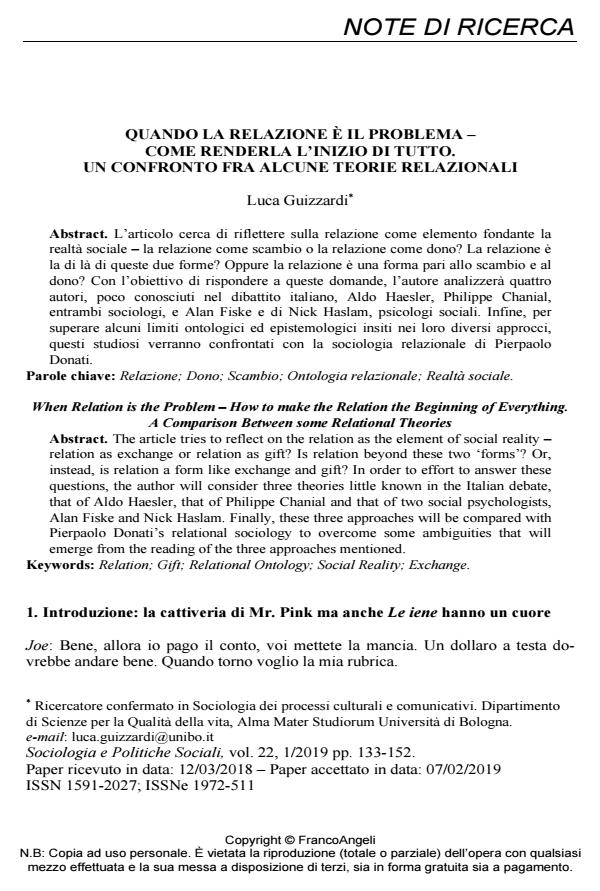When Relation is the Problem - How to make the Relation the Beginning of Everything. A Comparison Between some Relational Theories
Journal title SOCIOLOGIA E POLITICHE SOCIALI
Author/s Luca Guizzardi
Publishing Year 2019 Issue 2019/1
Language Italian Pages 20 P. 133-152 File size 257 KB
DOI 10.3280/SP2019-001007
DOI is like a bar code for intellectual property: to have more infomation
click here
Below, you can see the article first page
If you want to buy this article in PDF format, you can do it, following the instructions to buy download credits

FrancoAngeli is member of Publishers International Linking Association, Inc (PILA), a not-for-profit association which run the CrossRef service enabling links to and from online scholarly content.
The article tries to reflect on the relation as the element of social reality - relation as exchange or relation as gift? Is relation beyond these two ‘forms’? Or, instead, is relation a form like exchange and gift? In order to effort to answer these questions, the author will consider three theories little known in the Italian debate, that of Aldo Haesler, that of Philippe Chanial and that of two social psychologists, Alan Fiske and Nick Haslam. Finally, these three approaches will be compared with Pierpaolo Donati’s relational sociology to overcome some ambiguities that will emerge from the reading of the three approaches mentioned.
Keywords: Relation; Gift; Relational Ontology; Social Reality; Exchange.
- Azar Ofer H. 2007a. Why Pay Extra? Tipping and the Importance of Social Norms and Feelings in Economic Theory. The Journal of Socio-Economics, 36, pp. 250-265.
- — 2007b. Do People tip Strategically, to Improve Future Service? Theory and Evidence. Canadian Journal of Economics/Revue canadienne d’Economique, 40(2), pp. 515-527.
- Bagaoui, R. 2009. La sociologie relationelle comme principes structurants et comme théories sociales. Nouvelles perspectives en science sociale: revue internationale de systémique complexe et d’études relationelles, 5(1), pp. 25-29.
- Bajoit, G. 2007. Un paradigme systémique relationnel est-il possible? Proposition d’une typologie relationnelle. Nouvelles perspectives en science sociale: revue internationale de systémique complexe et d’études relationelles, 3(1), pp. 151-175.
- — 2009. Le concept de relation sociale. Nouvelles perspectives en science sociale: revue internationale de systémique complexe et d’études relationelles, 5(1), pp. 51-65.
- Bodvarsson Örn B. e Gibson William A. 1997. Economics and Restaurant Gratuities: Determining Tip Rates. American Journal of Economics and Sociology, 56(2), pp. 187-203.
- Bottero, W. 2009. Relationality and Social Interaction. The British Journal of Sociology, 60(2), pp. 399-420.
- Chanial, P. 2008. Introduction. Ce que le don donne à voir. In P. Chanial curé par La société vue du don. Manuel de sociologie anti-utilitariste appliquée, pp. 9-44. Paris: Éditions La Découverte/M.A.U.S.S.
- — 2011. La sociologie comme philosophie politique, et réciproquement…. Paris: Éditions La Découverte.
- Chanial, P. e Fisetti, F. 2011. Homo Donator. Come nasce il legame sociale. Genova: il melangolo.
- Donati, P. 1991. Teoria relazionale della società. Milano: FrancoAngeli.
- — 1993. Introduzione alla sociologia relazionale. Milano: FrancoAngeli.
- — 1998. La società è relazione. In P. Donati a cura di Lezioni di sociologia. Le categorie fondamentali per la comprensione della società, pp. 1-54. Padova: Cedam.
- — 2009. La società dell’umano. Genova-Milano: Marietti 1820.
- — 2013a. Sociologia della relazione. Bologna: il Mulino.
- — 2013b. Sociologia relazionale. Come cambia la società. Brescia: la Scuola.
- Elder-Vass Dave J. 2007. Social Structure and Social Relations. Journal for the Theory of Social Behaviour, 37(4), pp. 463-477.
- — 2015. Free Gifts and Positional Gifts: Beyond Exchangism. European Journal of Social Theory, 18(4), pp. 45-468.
- Fiske, Alan P. 1992. The Four Elementary Forms of Sociality: Framework for a Unified Theory of Social Relations. Psychological Review, 99(4), pp. 689-723.
- — 2004. Relational Model Theory 2.0. In N. Haslam ed. Relational Models Theory. A Contemporary Overview, pp. 3-25. Mahwah: Lawrence Erlbaum Associates.
- — 2012. Metarelational Models: Configurations of Social Relationships. European Journal of Social Psychology, 42, pp. 2-18.
- Fiske, Alan P. and Haslam Nick 2005. The Four Basic Social Bonds. Structures for Coordinating Interaction. In M.W. Baldwin ed. Interpersonal Cognition, pp. 267-298. New York: Guilford Press.
- Gambetta, D. 1993. The Sicilian Mafia: The Business of Private Protection. Cambridge-London: Harvard University Press.
- Gergen, K.J. 2009. La relation comme action collaborative. Nouvelles perspectives en science sociale: revue internationale de systémique complexe et d’études relationelles, 5(1), pp. 21-24.
- Giddens, A. 1992. The Transformation of Intimacy. Sexuality, Love and Eroticism in Modern Societies. Cambridge: Polity Press.
- Godbout, J. T. 1992. L’Esprit du don. Paris: la Découverte.
- Haesler, A. 1995. Sociologie de l’argent et postmodernité. Recherche sur le conséquences sociale et culturelles de l’électronisation des flux monétaires. Genève & Paris: Droz.
- — 2002. Symbolique et reconnaissance. Arguments pour une théorie sociologique de la relation humaine. Simmel Studies, 12(19), pp. 7-39.
- — 2016. Esquisse d’une théorie relationniste du changement social. Au commencement était la relation…mais après?, Revue du M.A.U.S.S., 47, premier semestre, pp. 121-134.
- Javeau, C. 2009. Aux deux moments des relations sociales. Nouvelles perspectives en science sociale: revue internationale de systémique complexe et d’études relationelles, 5(1), pp. 15-19.
- Lallement, M. 2009. L’institution au prisme de la relation. Nouvelles perspectives en science sociale: revue internationale de systémique complexe et d’études relationelles, 5(1), pp. 67-77.
- Martignani, L. 2009. Denaro e nuovo welfare. Roma: Aracne.
- — 2014. (Prima e dopo) il Manifesto di Mustafa Emirbayer: Sociologia transazionale e relazionale a confronto. Sociologia e politiche sociali, 17(1), pp. 97-114.
- Morandi, E., 2009. Prefazione. La ‘Relazione sociale’ come oltrepassamento di una sociologia del ‘non-umano’. In P. Donati. La società dell’umano, pp. 7-60. Genova-Milano: Marietti 1820.
- Searle, J.R. 2010. Creare il mondo sociale. La struttura della civiltà umana. Milano: Raffaello Cortina editore.
- Weber, M. 1961. Economia e società. I. Teoria delle categorie sociologiche, Milano: Edizioni di Comunità.
Luca Guizzardi, Quando la relazione è il problema - come renderla l’inizio di tutto. Un confronto fra alcune teorie relazionali in "SOCIOLOGIA E POLITICHE SOCIALI" 1/2019, pp 133-152, DOI: 10.3280/SP2019-001007